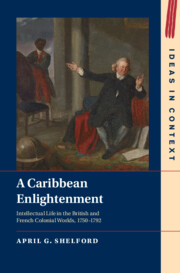Book contents
- A Caribbean Enlightenment
- Ideas in Context
- A Caribbean Enlightenment
- Copyright page
- Dedication
- Contents
- Figures
- Maps
- Tables
- Acknowledgments
- Note on the Text
- Abbreviations
- Chapter 1 What Is a Caribbean Enlightenment?
- Part I Before Breadfruit
- Part II Creating Enlightened Citizens
- Introduction to Part II
- Chapter 4 Making the Affiches, Making Americans
- Chapter 5 American Exceptionalism, Political Economy, and the Postwar Order in the Journal de Saint-Domingue
- Chapter 6 A Slave Named Voltaire; or, Gender and the Making of American Taste
- Conclusion to Part II
- Part III Tristram in the Tropics: or, Reading in Jamaica
- Part IV Cultivating Knowledge
- Bibliography
- Index
Chapter 6 - A Slave Named Voltaire; or, Gender and the Making of American Taste
from Part II - Creating Enlightened Citizens
Published online by Cambridge University Press: 14 September 2023
- A Caribbean Enlightenment
- Ideas in Context
- A Caribbean Enlightenment
- Copyright page
- Dedication
- Contents
- Figures
- Maps
- Tables
- Acknowledgments
- Note on the Text
- Abbreviations
- Chapter 1 What Is a Caribbean Enlightenment?
- Part I Before Breadfruit
- Part II Creating Enlightened Citizens
- Introduction to Part II
- Chapter 4 Making the Affiches, Making Americans
- Chapter 5 American Exceptionalism, Political Economy, and the Postwar Order in the Journal de Saint-Domingue
- Chapter 6 A Slave Named Voltaire; or, Gender and the Making of American Taste
- Conclusion to Part II
- Part III Tristram in the Tropics: or, Reading in Jamaica
- Part IV Cultivating Knowledge
- Bibliography
- Index
Summary
During its short publishing life, the Iris Américaine proposed a complement to the enlightened White male American citizen promoted by Saint-Domingue’s other two periodicals, the Affiches Américaines and the Journal de Saint-Domingue. After summarizing the contributions of the Affiches and the Journal to the island’s cultural life and discussing the importance of “taste” in French cultural life, the chapter documents how the Iris honored the age-old dictum “to instruct and delight” by publishing a mix of diverting poetry, short stories, and nonfiction essays. Yet its content, however light, had the serious intent of tutoring White women in good taste—both for their own good and to civilize their men by transforming unruly passions into refined pleasures. While these objectives were framed in a metropolitan terms, they assumed special urgency in a society infamous for racial brutality and “disordered” sexuality. Thus, the Iris spoke to deep social anxieties and threatening realities: the failure to establish a stable, White population; the ubiquitous concubinage of enslaved Black women and free women of color; the consequent increase in the number of mixed-race people; and the fact that White colonists were vastly outnumbered by enslaved Black people.
Keywords
- Type
- Chapter
- Information
- A Caribbean EnlightenmentIntellectual Life in the British and French Colonial Worlds, 1750–1792, pp. 143 - 161Publisher: Cambridge University PressPrint publication year: 2023

